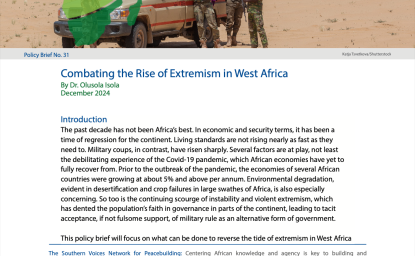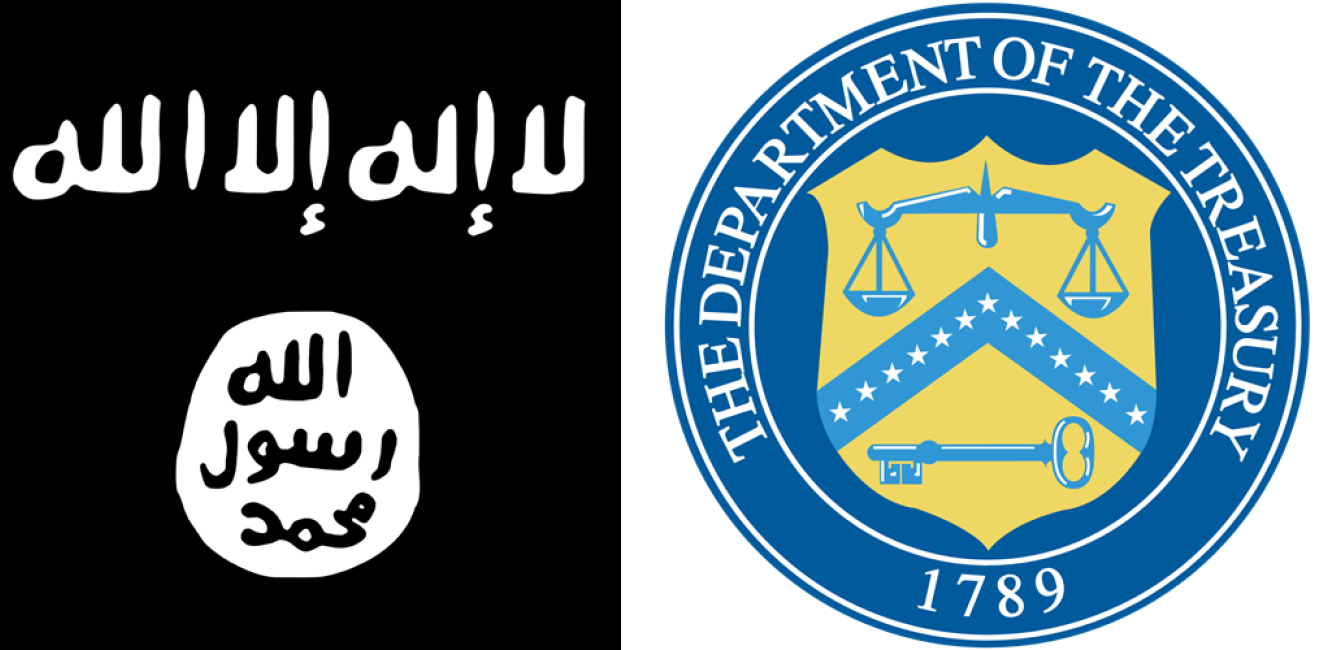On May 9, the U.S. Treasury sanctioned a network of Indonesians—operating across Indonesia, Syria and Turkey—who have financed ISIS recruits and their travel. The three men and two women—all Indonesian nationals—helped the extremists travel to Syria and other unnamed places to join the Sunni jihadi movement. “By designating them, we aim to expose and disrupt an international ISIS facilitation network that has financed ISIS recruitment, including of vulnerable children in Syria,” Secretary of State Antony Blinken said in a statement. The Treasury warned that ISIS is “particularly focused on smuggling children out of displaced persons camps for recruitment as fighters.” The largest camp al Hol, (also spelled al Hawl), is home to some 70,000 people, most of whom are women and children related to ISIS fighters.
The five people were designated under Executive Order 13224, which President George W. Bush signed less than two weeks after the 9/11 attacks. The order authorizes the U.S. government to block the assets of foreign individuals and entities that commit, or pose a significant risk of committing, acts of terrorism. It also allows the designation for providing support, services, or assistance to terrorists. The new U.S. sanctions coincided with the 16th meeting of the U.S.-led Counter ISIS Finance Group of the Global Coalition to Defeat ISIS held in Morocco on May 11. The following is the Treasury’s press release and Blinken’s statement.
Treasury Designates Facilitation Network Supporting ISIS Members in Syria
Today, the U.S. Department of the Treasury’s Office of Foreign Assets Control (OFAC) designated a network of five Islamic State of Iraq and Syria (ISIS) financial facilitators operating across Indonesia, Syria, and Turkey. The five individuals, who are designated today pursuant to Executive Order (E.O.) 13224, as amended, have played a key role in facilitating the travel of extremists to Syria and other areas where ISIS operates. This network has also conducted financial transfers to support ISIS efforts in Syria-based displaced persons camps by collecting funds in Indonesia and Turkey, some of which were used to pay for smuggling children out of the camps and delivering them to ISIS foreign fighters as potential recruits.
This action coincides with the 16th meeting of the Counter ISIS Finance Group (CIFG) of the Global Coalition to Defeat ISIS. The United States, Italy, and Saudi Arabia co-lead the CIFG—comprising nearly 70 countries and international organizations—and coordinate efforts against ISIS financial support networks worldwide.
“Today, Treasury has taken action to expose and disrupt an international facilitation network that has supported ISIS recruitment, including the recruitment of vulnerable children in Syria,” said Under Secretary of the Treasury for Terrorism and Financial Intelligence Brian E. Nelson. “The United States, as part of the Global Coalition to Defeat ISIS, is committed to denying ISIS the ability to raise and move funds across multiple jurisdictions.”
Residents of displaced persons camps in Syria include those who have been displaced by ISIS, as well as ISIS members, supporters, and their families. ISIS sympathizers in over 40 countries have sent money to ISIS-linked individuals in these camps in support of ISIS’s future resurgence. Al-Hawl is the largest displaced persons camp in northeast Syria, and it holds up to 70,000 people, most of whom are women and children. In al-Hawl alone, ISIS supporters have received up to $20,000 per month via hawala, an informal transfer mechanism; the majority of those funds transfers have originated outside Syria or passed through neighboring countries such as Turkey. Additionally, since 2019, ISIS has been smuggling its associates out of al-Hawl largely to Idlib, Deir ez-Zor, and Raqqa Governorates in Syria. ISIS is particularly focused on smuggling children out of displaced persons camps for recruitment as fighters.
Dwi Dahlia Susanti and Other ISIS Facilitators
Dwi Dahlia Susanti has been an ISIS financial facilitator since at least 2017 and has assisted other ISIS members with money transfers involving individuals in Indonesia, Turkey, and Syria. In late 2017, Susanti helped her husband deliver nearly $4,000 and weapons to an ISIS leader. At that time, Susanti diverted about $500 of these funds for ISIS supporters in her own network.
As of early 2021, Susanti has facilitated money transfers from Indonesia to Syria in order to provide funds to individuals in displaced person camps. In some cases, these funds were used to smuggle teenage children out of the camps to the desert, where they were received by ISIS foreign fighters, likely as child recruits for ISIS.
In mid-2019, Rudi Heryadi advised an extremist associate about potential travel to ISIS-dominated areas, including in Afghanistan, Egypt and other parts of Africa, and Yemen. Heryadi also asked for donations for travelers and their families. On June 24, 2020, Indonesian authorities convicted Heryadi on terrorism charges.
Today’s action also targets ISIS facilitator Ari Kardian, who was previously charged by Indonesian authorities for facilitating the travel of Indonesians to Syria to join ISIS.
Dwi Dahlia Susanti, Rudi Heryadi and Ari Kardian are being designated pursuant to E.O. 13224, as amended, for having materially assisted, sponsored, or provided financial, material, or technological support for, or goods or services to or in support of, ISIS.
Susanti’s Accomplices and Financial Facilitators
On numerous occasions, Muhammad Dandi Adhiguna provided assistance to Susanti, including for financial and operational matters. Adhiguna has advised Susanti on the use of her personal bank accounts. In late 2021, Adhiguna completed a registration form to join ISIS and sent it to Susanti.
Dini Ramadhani provided financial assistance to Susanti on multiple occasions.
Muhammad Dandi Adhiguna and Dini Ramadhani are being designated pursuant to E.O. 13224, as amended, for having materially assisted, sponsored, or provided financial, material, or technological support for, or goods or services to or in support of, Susanti.
Sanctions Implications
As a result of today’s action, all property and interests in property of the individuals named above, and of any entities that are owned, directly or indirectly, 50 percent or more by them, individually, or with other blocked persons, that are in the United States or in the possession or control of U.S. persons must be blocked and reported to OFAC. Unless authorized by a general or specific license issued by OFAC or otherwise exempt, OFAC’s regulations generally prohibit all transactions by U.S. persons or within the United States (including transactions transiting the United States) that involve any property or interests in property of designated or otherwise blocked persons.
Furthermore, engaging in certain transactions with the individuals designated today entails risk of secondary sanctions pursuant to E.O. 13224, as amended. Pursuant to this authority, OFAC can prohibit or impose strict conditions on the opening or maintaining in the United States of a correspondent account or a payable-through account of a foreign financial institution that knowingly conducted or facilitated any significant transaction on behalf of a Specially Designated Global Terrorist.
The power and integrity of OFAC sanctions derive not only from its ability to designate and add persons to the SDN List, but also from its willingness to remove persons from the SDN List consistent with the law. The ultimate goal of sanctions is not to punish, but to bring about a positive change in behavior. For information concerning the process for seeking removal from any OFAC list, including the Specially Designated Nationals and Blocked Persons List, please refer to OFAC’s Frequently Asked Question 897. Additional information regarding sanctions programs administered by OFAC can be found here.
Secretary of State Antony Blinken
Designating an International ISIS Network of Financial Facilitators
Coinciding with the 16th meeting of the Counter ISIS Finance Group (CIFG) of the Global Coalition to Defeat ISIS, the United States is designating today five individuals participating in an ISIS network of financial facilitators operating across Indonesia, Syria, and Turkey. The United States, Italy, and Saudi Arabia co-lead the CIFG, which comprises nearly 70 countries and international organizations and coordinates efforts against ISIS financial support networks worldwide. The United States is committed to working with the Global Coalition to deny ISIS the ability to raise and move funds across multiple jurisdictions.
The individuals designated today, pursuant to Executive Order 13224, as amended, have facilitated the travel of violent extremists to Syria and other areas where ISIS operates. By designating them, we aim to expose and disrupt an international ISIS facilitation network that has financed ISIS recruitment, including of vulnerable children in Syria.

The Islamists
Learn more about Hamas and how it relates to similarly aligned organizations throughout the region. Read more

Explore More
Browse Insights & Analysis
What Trump’s 2025 Inauguration Speech Says About US-Mexico Policy



